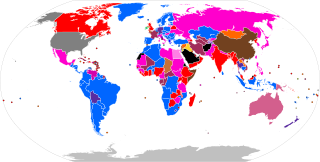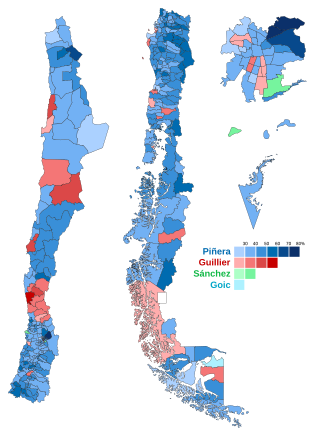
Proportional representation (PR) refers to any type of electoral system under which subgroups of an electorate are reflected proportionately in the elected body. The concept applies mainly to political divisions among voters. The essence of such systems is that all votes cast – or almost all votes cast – contribute to the result and are effectively used to help elect someone – not just a bare plurality or (exclusively) the majority – and that the system produces mixed, balanced representation reflecting how votes are cast.
Single non-transferable vote or SNTV is an electoral system used to elect multiple winners. It is a generalization of first-past-the-post, applied to multi-member districts with each voter casting just one vote. Unlike FPTP, which is a single-winner system, in SNTV multiple winners are elected, typically in electoral districts; additionally, unlike FPTP, SNTV produces mixed representation and makes it unlikely for a single party to take all the seats in a city or a set area, which can happen under FPTP.
Block voting, also known as bloc voting, refers to certain electoral systems where multiple candidates are elected simultaneously. They do not guarantee minority representation and allow a group of voters to ensure that only their preferred candidates are elected. In these systems, a voter can select as many candidates as there are open seats. That is, the voter has as many votes to cast as the number of seats to fill. The block voting systems are among various election systems available for use in multi-member districts where the voting system allows for the selection of multiple winners at once.

The Christian Democratic Party is a Christian democratic political party in Chile. There have been three Christian Democrat presidents in the past, Eduardo Frei Ruiz-Tagle, Patricio Aylwin, and Eduardo Frei Montalva.

The Independent Democratic Union is a conservative and right-wing political party in Chile, founded in 1983. Its founder was the lawyer, politician and law professor Jaime Guzmán, a civilian allied with Augusto Pinochet. Guzmán was a senator from 1990 until his murder by communist guerrillas on April 1, 1991.
An electoral district, also known as an election district, legislative district, voting district, constituency, riding, ward, division, electorate, or (election) precinct, is a subdivision of a larger state created to provide its population with representation in the larger state's constituency. That body, or the state's constitution or a body established for that purpose, determines each district's boundaries and whether each will be represented by a single member or multiple members. Generally, only voters (constituents) who reside within the district are permitted to vote in an election held there. District representatives may be elected by a first-past-the-post system, a proportional representative system, or another voting method. They may be selected by a direct election under universal suffrage, an indirect election, or another form of suffrage.

Elections in Chile are held nationwide, including the presidency, parliament, regional offices, and municipal positions. Chilean citizens and foreign residents with legal residency of at least five years, who are 18 years or older on election day, are eligible to vote. Previously, voting was voluntary, but since 2023, it has become compulsory.

The Communist Party of Chile is a communist party in Chile. It was founded in 1912 as the Socialist Workers' Party and adopted its current name in 1922. The party established a youth wing, the Communist Youth of Chile, in 1932.

General elections were held in Chile on 11 December 1993 to elect the President, members of the Chamber of Deputies and elected members of the Senate. Eduardo Frei Ruiz-Tagle of the Concertación alliance was elected President, and the alliance also won a majority of seats in the Chamber of Deputies and maintained its majority in the Senate. As of 2024, this is the most recent presidential election that did not result in a runoff.

José Andrés Rafael Zaldívar Larraín, popularly known as El Chico Zaldívar, is a prominent Chilean Christian Democrat politician. Andrés Zaldívar is of Basque descent.

On 11 March 1990, Chile the military regime of General Augusto Pinochet ended and was replaced by a democratically elected government. This transitional period lasted roughly two years although some processes may have lasted significantly longer. Unlike most democratic transitions led by either the elite or the people, this democratic transition process is known as an intermediate transition – a transition involving both the regime and the civil society. Throughout the transition, as the regime increased repressive violence, it simultaneously supported liberalization – progressively strengthening democratic institutions and gradually weakening that of the military.
The multiple non-transferable vote (MNTV) is a group of voting system, in which voters elect several representatives at once, with each voter having more than one vote. MNTV uses multi-member electoral districts or only one district, which contains all voters, which is used to provide at-large representation.
Plurality block voting, also known as plurality-at-large voting, bloc vote or block voting (BV) is a non-proportional voting system for electing representatives in multi-winner elections. Each voter may cast as many votes as the number of seats to be filled. The usual result when the candidates divide into parties is that the most popular party in the district sees its full slate of candidates elected in a seemingly landslide victory.
Semi-proportional representation characterizes multi-winner electoral systems which allow representation of minorities, but are not intended to reflect the strength of the competing political forces in close proportion to the votes they receive. Semi-proportional voting systems can be regarded as compromises between forms of proportional representation such as party-list PR, and plurality/majoritarian systems such as first-past-the-post voting. Examples of semi-proportional systems include the single non-transferable vote, limited voting, and parallel voting.

An electoral system or voting system is a set of rules that determine how elections and referendums are conducted and how their results are determined. Electoral systems are used in politics to elect governments, while non-political elections may take place in business, non-profit organisations and informal organisations. These rules govern all aspects of the voting process: when elections occur, who is allowed to vote, who can stand as a candidate, how ballots are marked and cast, how the ballots are counted, how votes translate into the election outcome, limits on campaign spending, and other factors that can affect the result. Political electoral systems are defined by constitutions and electoral laws, are typically conducted by election commissions, and can use multiple types of elections for different offices.
A majoritarian electoral system is an electoral system where the candidates or parties with the most votes takes all seats using the winner-takes-all principle and in this way provides majoritarian representation. However, there are many electoral systems considered majoritarian based on different definitions, including types of at-large majoritarian representation such as block voting or party block voting, but district-based majoritarian systems such as first-past-the-post voting (FPTP/SMP). Where two candidates are in the running, the one with the most votes will have a majority, but where there are three or more candidates, it often happens that no candidate takes a majority of the votes.

General elections were held in Chile on 19 November 2017, including presidential, parliamentary and regional elections.

The Broad Front is a Chilean political coalition founded in early 2017, composed of left-wing parties and movements. Its first electoral contest was the 2017 Chilean general election, where their presidential candidate Beatriz Sánchez came third with 20% of the vote in the first round of election. The Broad Front also expanded their electoral representation to 20 deputies, 1 senator and 21 out of 278 Regional Councillors, thus consolidating the movement as the 'third force' in Chilean politics.

An election for the members of the Constitutional Convention was held in Chile between 15 and 16 May 2021. This election was called after 78% of voters in the 2020 national plebiscite voted to write a new Constitution through this method.












